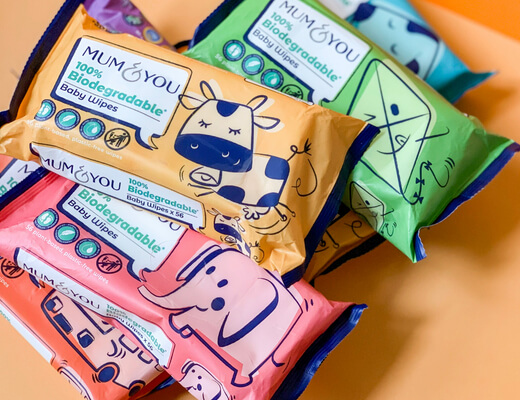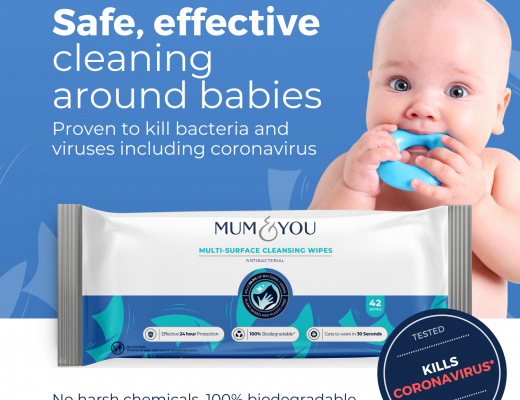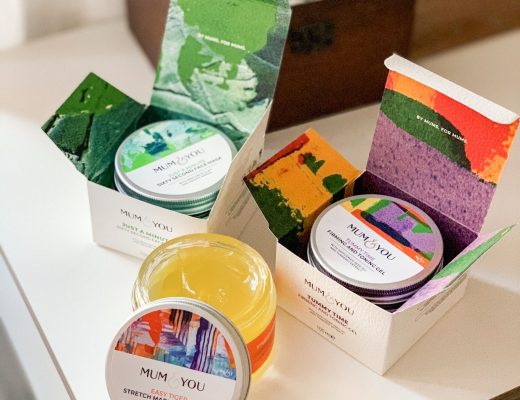Last year, Mum & You was challenged by corporate giants Proctor & Gamble regarding a claim we had made in our communications and advertising.
As a very small purpose-led company, we work tirelessly and use up many of our resources to run the most appropriate studies at internationally reputed International Organization for Standardizations (ISO) laboratories to substantiate our claims.
However, we are pleased to reassure our customers that our wipes are still 100% biodegradable and plastic-free, a claim which was upheld by the Advertising Standards Authority.
Who are the ASA and what do they do?
The Advertising Standards Authority (ASA) is the UK’s independent advertising regulator. The ASA makes sure ads across UK media stick to the advertising rules.
The ASA investigates complaints and monitors ads to ensure they stick to the rules. Their sister organisation, the Committees of Advertising Practice (CAP), writes and maintains the rules and provides advice and guidance.
How did this challenge come about?
Corporate giant Proctor & Gamble (P&G) submitted a complaint to the ASA against one of our adverts. P&G stated that they had found 3 issues with statements made in our advertising. One was informally resolved after we agreed to amend our advertising.
Procter & Gamble UK challenged whether the following two claims were misleading and could be substantiated:
1. “Our tests show that our wipes break down quickly after they are thrown away; in as little as 15 days; even in landfill conditions” because they believed that the most appropriate test had not been used to determine this timeframe; and
2. “Being biodegradable is important to us as it means today’s mess won’t be a problem for tomorrow’s generation”.
What does this mean?
To put it simply, P&G believed that we did not conduct the correct testing method to substantiate our claim that “Our tests show that our wipes break down quickly after they are thrown away; in as little as 15 days; even in landfill conditions”. They took issue with the speed in which we claimed they biodegrade (rest assured, there was no challenge regarding if they biodegrade at all!).
Secondly, they took issue with us stating “Being biodegradable is important to us as it means today’s mess won’t be a problem for tomorrow’s generation”.
What process did you undertake to substantiate your biodegradability claim in the first instance?
In 2017, we took advisement from experts in biodegradability trials from one of the largest ISO-accredited laboratories. You simply cannot claim your product is biodegradable without conducting tests to prove this.
We were advised to undertake a particular test by experts in biodegradability trials. We believe the study we ran was the most appropriate study to measure the biodegradability timeframe in landfill conditions. We are aware that other companies have used the same test method. There was an alternative method, but the lab advised us that this does not necessarily produce reliable or repeatable results. The ASA agreed that the test we used was more reliable and reproducible, however, they concluded that the conditions were too optimised.
This test concluded that our wipes biodegrade in 15 days in simulated landfill conditions. The “simulated landfill conditions” was not explicitly disclosed to us at this stage in our investigations.
We provided two reports from a biodegradability testing company. The first related to the wipes’ biodegradation in landfill conditions, and the second to their biodegradation in composting conditions. Both tests used industry-standard methods.
The first report calculated the biodegradation of Mum & You Baby Wipes according to the international standard ASTM D5511 (2018) “Standard Test Method for Determining Anaerobic Biodegradation of Plastic Materials Under High-Solids Anaerobic-Digestion Conditions”.
When we were challenged about this claim, the only lab then advised us that “15 days in landfill” is attributed to lab testing, not real-life scenarios. This was not initially disclosed to us.
What has the ASA ruled?
The ASA has advised us to remove these two statements from our advertising and marketing communications.
They concluded that the claim “Being biodegradable is important to us as it means today’s mess won’t be a problem for tomorrow’s generation” had not been substantiated and was therefore misleading.
P&G challenged and the ASA upheld that being biodegradable isn’t necessarily a good thing (we’ll let you be the judge on that one). They discussed that greenhouse gas emissions were produced when biodegradable wipes were placed in landfill, but we understand that some of the methane was captured on site and used as an energy source. Additionally, the use of controlled biological processes such as anaerobic digestion allowed for the methane to be captured in a closed system, which prevented it from being released into the atmosphere.
The ASA has also upheld that we have not used the correct testing method to substantiate our claim for biodegradability in 15 days in landfill.
What have you done in response to this ruling?
We have accepted the ASA’s ruling and have removed all references to this trial and the 15-day biodegradability claim (test method: ASTM D5511). We can however continue to claim 100% biodegradable.
We apologise for making this claim and are extremely disappointed to have been misinformed about the biodegradation timeframe.
We have also removed all reference to “today’s mess won’t be a problem for tomorrow’s generation”, as the ASA concluded that there was no way to tell if this is scientifically achievable.
Does this mean your wipes aren’t actually biodegradable?
You’ll be pleased to know that our plastic-free wipes are tried and tested (and correctly substantiated) and are 100% biodegradable!
We would like to reiterate that their biodegradability feature is not what is being contested by the ASA. The ASA has ruled that they are indeed biodegradable. What is being contested, however, is how long it takes for them to biodegrade and the test method used to calculate this.
The ASA concludes: “We understood that the Mum & You wipes were made from viscose, a natural fibre derived from wood, and that viscose was able to biodegrade through the action of microorganisms to form water and carbon dioxide. We therefore understood that the wipes could eventually biodegrade in all conditions, including in environments such as landfills.”
What should your customers be aware of?
When we created our baby wipes back in 2017, we were one of the first to create biodegradable alternatives at a time when the benefits of being biodegradable and plastic-free were less known to the vast majority of consumers.
We were even the first company to introduce baby wipes in 100% recyclable packaging.
As a small company consisting of just under 20 employees, we always try to do right by our customers and our planet, and we invest scarce resources to ensure we keep this up. We are constantly innovating with the aim to create products that are eco-friendly and kind to babies and their parents.
We would like to assure our loyal customers that our plastic-free baby wipes have always been 100% biodegradable, and continue to be so. They are also home-compostable according to European Standards EN13432 and are certified by TÜV Austria as OK compost Home. Our 100% recyclable packaging can be recycled with soft plastics at your local supermarket.
We are not immune to making mistakes, but we have taken the steps to rectify them as soon as they were brought to our attention. We hope this blog helps to answer any queries you may have.
We share your passion and would love to have the opportunity to speak to you directly if you would like any further information from Mum & You. You can contact our friendly customer services team here.
Read more





No Comments